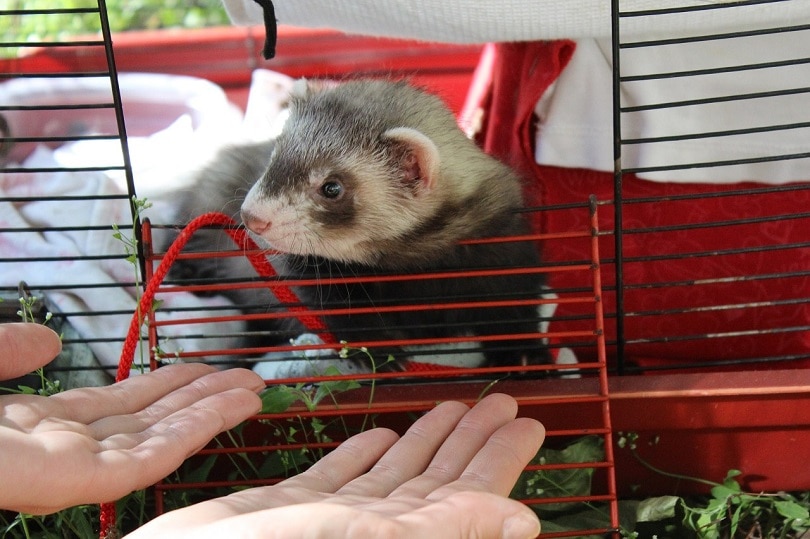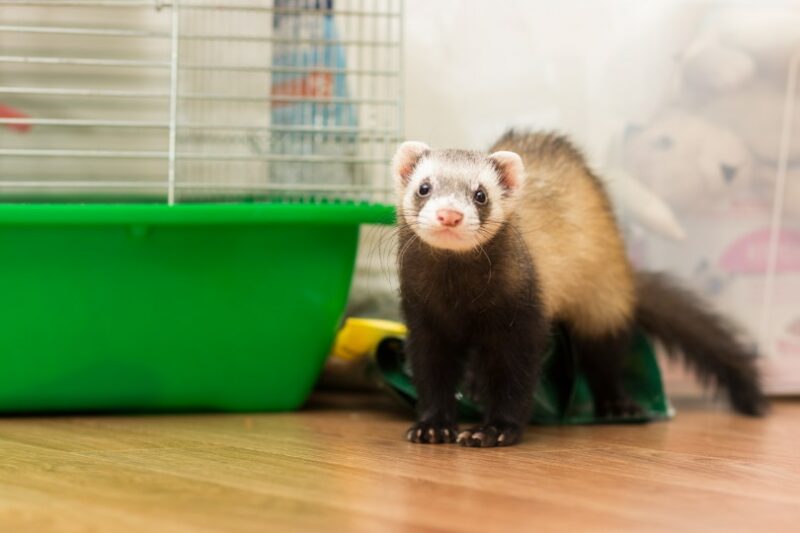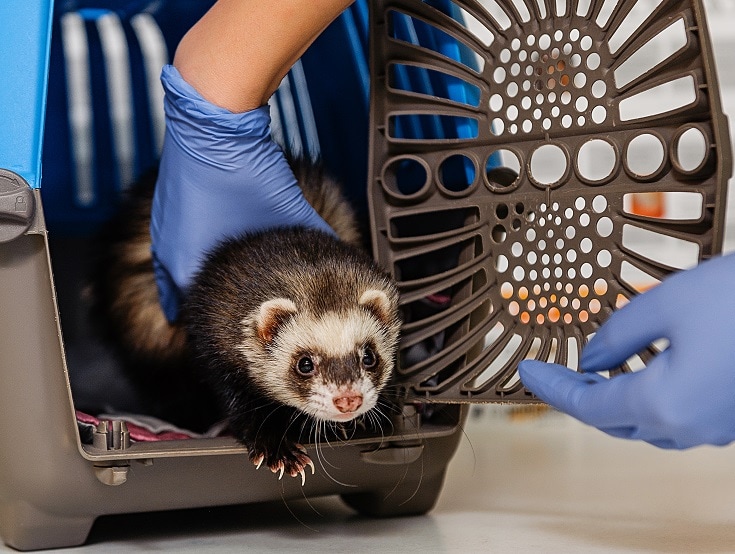
Ferrets can get sick and injured just like any other pet and, therefore, need veterinary medicine. And there are some effective treatments for their most common diseases, especially if caught early enough.
The intensive domestic breeding of ferrets has left them with predispositions to several diseases that they tend to get repeatedly. Getting a check-up every 6–12 months can help improve your ferret’s health and life span by catching these problems early.
The 10 Common Ferret Health Problems
1. Gastrointestinal Disease
Vomiting and/or diarrhea are common signs of gastrointestinal disease. Several things can cause this:
Sometimes, it is a transitory problem that goes away quickly on its own, especially for mild problems such as eating too many treats. However, it can be more serious and may need veterinary treatment.
Ferrets can get food poisoning from dangerous bacteria in raw food, which include salmonella and campylobacter. Feeding raw meat is a major source of some of the most dangerous food-borne pathogens: germs. Raw food can also carry parasites, worms, or single-celled protozoa, which can cause GI disease and be passed to family members. Carefully weigh the benefits of feeding raw food against the potentially deadly risks.
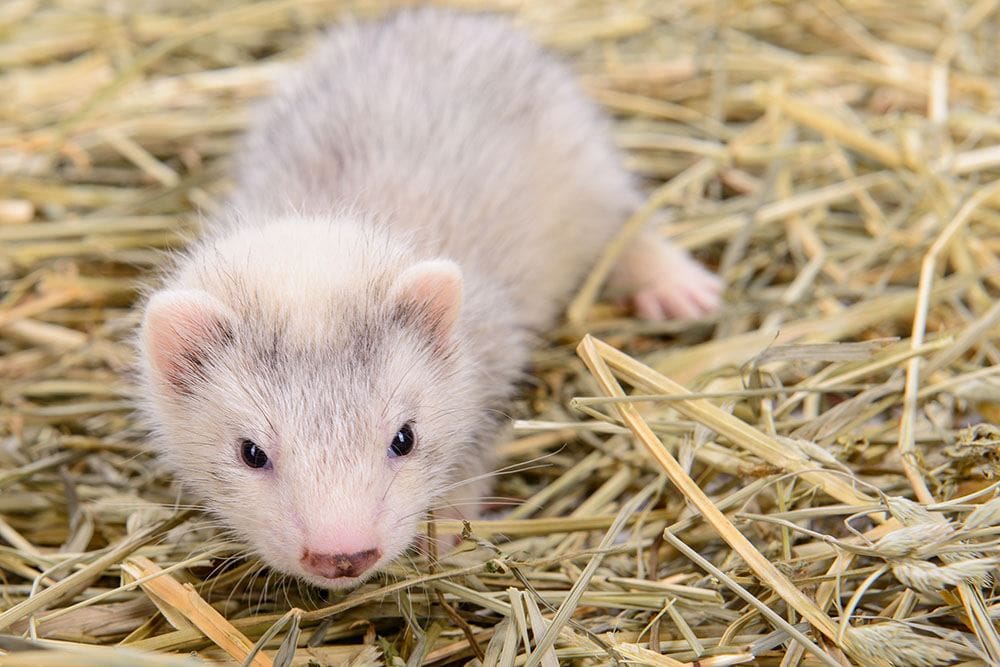
2. Gastrointestinal Obstruction
Ferrets eating things they are not supposed to and getting hairballs can cause an obstruction in their gastrointestinal tract—either in the stomach, intestines, or colon.
If they eat a Lego, for example, it can get wedged in their intestines, blocking the digestive tract, and creating a backup of food. Blocked GI tracts can be very dangerous. On the other hand, the foreign object eaten can pass through the system without causing any problems. It is always a gamble.
If you know your ferret has eaten something they were not supposed to, watch out for gastrointestinal clinical signs:
A Note About Nausea: Since you cannot ask your ferret if they feel nauseous, you might not know that they feel sick. However, they do show some behavioral changes that may help you spot it:
If the foreign object does get stuck, they may need surgery to remove it. Knowing what they ate and when can help the vet triage the situation. Also, tell them if your ferret is shedding a lot or if you suspect a hairball. All clues help.
3. Heart Disease
Heart disease is unfortunately common in our ferrets. Many ferrets do not have the strongest genetics, and so they are prone to various diseases—and heart disease is one of them, specifically dilated cardiomyopathy.
Heart disease can often be managed with medications. If your ferret is diagnosed with heart disease, they will most likely be put on medications for the rest of their lives to support their heart.
It can be difficult to see signs of heart disease. The heart doesn’t tend to show signs of struggling until it is severely compromised. However, some of the signs to watch for are listed below.

4. External Parasites
Ferrets can get fleas, especially from other pets that go outside and might be exposed to them more easily. They can also get mites and mange, all of which are itchy and uncomfortable.
Flea and mite infections need to be treated with medication. You cannot brush away fleas, even with a flea comb. Having regular vet checks to search for fleas is important because they can be hard to find.
5. Distemper
Luckily, distemper is not common in our pet ferrets because of vaccinations. Don’t let the name fool you; the canine distemper virus infects ferrets easily and is deadly. Without vaccines, it would be much more devastating than it is now.
Distemper virus is very contagious and can develop into a severe infection within one week; death is quick to follow. Watch for the following signs:
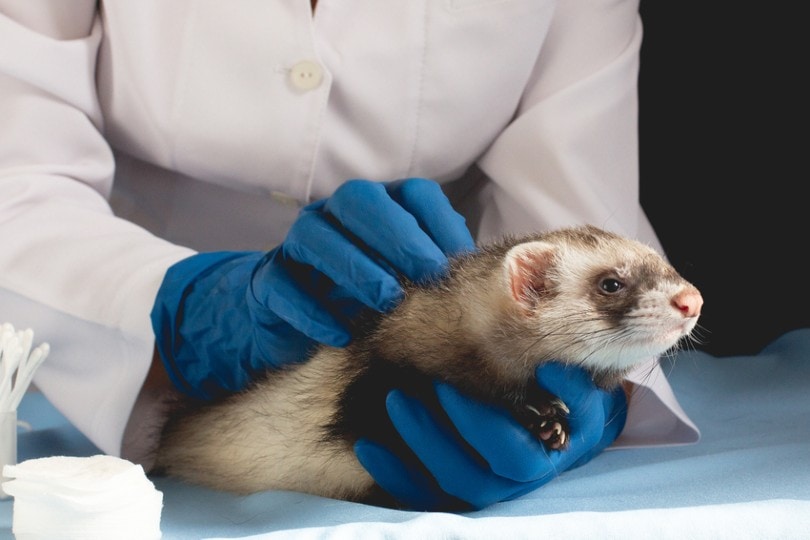
6. Cancer
Cancer is common in ferrets. Unfortunately, cancer can affect any body organ or any system. As a result, the signs of cancer are almost infinitely diverse. Instead, here are some of the body systems where cancer can strike:
As your ferret ages, getting regular physical exams at the vet is the best way to catch cancer early. But if you notice any suspicious changes, always bring them to the vet as well.
7. Lymphoma
Lymphoma is a cancer of the immune system. The immune system is spread across the entire body and includes organs such as the spleen, lymph nodes, and bone marrow. The immune system is the body’s defense against infections; it heals and mends the body. With an impaired immune system, it cannot fight against disease, so even basic germs become much more dangerous.
Lymphoma can hide inside the body with few clinical signs of disease until suddenly everything seems to go wrong at once. Ferrets can hide how severe the cancer is, but at the same time, there are many severe problems that can arise from this diverse cancer. The signs of lymphoma can be vague:

8. Insulinoma
Insulinomas are also a type of cancer, a common ferret cancer. Insulinomas affect the hormonal regulating system, specifically the cells that produce insulin. Insulin is vital for controlling glucose (blood sugar) levels.
Too much insulin as a result of an insulinoma lowers the amount of glucose in the bloodstream to dangerous levels. This is called hypoglycemia—not enough blood sugar— and it can be very dangerous, if it gets bad enough, ferrets can end up in a coma. Treatment requires medication, dietary changes, and monitoring. Watch for these signs:
9. Adrenal Gland Disease (Hyperadrenocorticism)
This type of adrenal gland disease is called hyperadrenocorticism. It enlarges the adrenal glands so that they produce so many hormones the body eventually cannot keep up.
The adrenal glands are hormonal organs that sit just in front of the kidneys. They are usually regulated by feedback from the hormonal regulating system, but in hyperadrenocorticism, that regulation is lost because the adrenal glands get so big.
The excess of hormones wears on the body, and without veterinary treatment, it eventually becomes unmanageable. Get them a check-up if you notice any of the following changes.

10. Injuries
Ferrets are busy little creatures. Their days are filled with trouble-making and adventures, which, of course, means they are prone to getting injured. They can get cuts, bruises and break their bones, just like any pet. If they hurt themselves, they will usually have to endure some restricted movement while they heal.
You may not know that your ferret has injured themselves as they often hide their pain. Plus, if they get a cut, their skin usually does not swell like our skin, so it can be harder to find. Examining your ferret daily and feeling their body can help you identify hidden injuries.

Summary
Ferrets are rambunctious, playful pets. They are great fun to play with and provide great companionship. Taking care of your ferret means accommodating their unique needs for space, food, and health monitoring.
Getting to know your ferrets’ unusual body type and playful personality will help you monitor their health. When things go wrong, you will notice the changes, in their fur, in their belly, or in their playing habits. Having a close relationship with them is just the best.
Featured Image Credit: flywish, shutterstock


